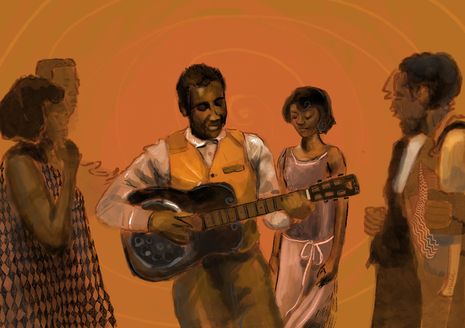Sinners: a damning indictment of America’s vampiric music industry
Apeike Umolu explores how Ryan Coogler’s smash hit vampire movie Sinners exposes the structural racism in America’s music industry

Ryan Coogler’s Sinners is more than a vampire movie. Recently, Kanye West hit headlines for trying to do what Coogler does in this film – confront the murky relationship between race, money, and music in America. Coogler’s attempt is more sophisticated, but no less unflinching.
The brilliance of Black music is seen throughout the film. From the main character Sammie’s humble church where gospel harmonies stream out, to the blues and jazz stompers that Sammie unleashes in the juke joint, a Black-owned club. The trope of the Black musician has long been used to acknowledge Black genius, while denying that that genius goes beyond music. Coogler wants to show that Black music is indeed exceptional but not ‘God-given’; it is the result of generations of cultivation. The juke joint is Black people’s attempt to take their music to the masses and keep the profits.
Then some white vampires turn up. When they are told they can’t enter, they ask if they can take Sammie instead. The audacity of the request hints at America’s slave-owning past. The juke joint refuses; Sammie is family. But really Sammie is Black music; Sammie is Black genius; Sammie belongs to Black people.
The vampires are a not-so-subtle allusion to America’s music industry and its structural racism. Kanye’s recent views and behaviour are utterly reprehensible; yet, his high profile suing of his record company in 2020 is consequential for understanding the history of the exploitation of Black music. West labelled his record company a “modern day slave ship”, because under his contract he was doomed to perpetual “servitude”. He was unable to take a break or quit, and he didn’t own his music. In essence, his contract was vampiric. Ever since, in frantic pleas, Kanye’s been arguing that the music industry has replaced the plantation as a site of Black exploitation.
This is what Coogler shows us in Sinners too. The vampires’ objective, like record companies’, is to capture Black music. The main vampire arrives with two gold discs – the awards given to artists by the music industry. But the Black people never see the discs. The vampire only shows them to the white people he recruits to join him. This is enough to make them abandon their KKK antics and begin stealing Black music. Coogler is telling us that record contracts have replaced lynchings as a form of Black persecution.
“Record contracts have replaced lynchings as a form of Black persecution”
But the whole ecosystem is vampiric. In the film, the white people who sold the juke joint to the Black people plan to kill them and take the venue back. This alludes to the vice-like grip that white people have on all aspects of the music industry. From financing, to venues, to ticketing. If you don’t “dance to the right tune”, you are “lynched” out of the system.
We see this in the film when Black people are given a chilling ultimatum: sell your soul to the devil (i.e. sign the contract) and you can profit from your music, or die. Coogler wants to show that many musicians have sold themselves to the devil, with the likes of Kanye amassing immense wealth. But at what cost?
“Black people are given a chilling ultimatum: sell your soul to the devil (i.e. sign the contract) and you can profit from your music, or die”
In 2004’s ‘All Fall’s Down’, Kanye predicted what would happen to him. He admitted he’d been bitten, “I got a problem with spendin’ before I get it”. He bought expensive things, “cause they made us hate ourself and love they wealth”. And the chorus repeats prophetically that he knows it will all fall down.
But Hip-hop, when in distress, returns to its roots. In the last scene of the film, a Black man bitten by the vampires visits a grown-up Sammie who, having survived, is playing music in a local blues club. The vampire dons the attire and exudes the wealth of a Hip Hop impresario. He goes to Sammie because he wants to reconnect with the Black music that Sammie represents.
This is what Kanye was doing when he started his Sunday Services in 2020. The services were stripped-back religion-tinged performances paying homage to the blues and gospel roots of Black music. Held in churches and open fields, Kanye effectively opened his own juke joint to escape the clutches of the vampires.
It’s interesting as Kanye’s ‘All Fall’s Down’ samples Lauryn Hill’s ‘Mystery of Iniquity’, a song about America’s systemic injustices. She first played it at a stripped-down religion-tinged performance in 2001, avoiding the trappings of the music industry (and yes, they called her crazy). The religious scripture that inspired Lauryn’s song is about a mysterious and powerful man who starts controlling people using magic to deceive them. He sounds a lot like Coogler’s vampires and Kanye’s record executives!
The music industry sucks the lifeblood from Black music. But blues and gospel remain reservoirs of Black genius. When in distress, Hip Hop can always return to its roots.
 Comment / The (Dys)functions of student politics at Cambridge19 January 2026
Comment / The (Dys)functions of student politics at Cambridge19 January 2026 Arts / Exploring Cambridge’s modernist architecture20 January 2026
Arts / Exploring Cambridge’s modernist architecture20 January 2026 Features / Exploring Cambridge’s past, present, and future18 January 2026
Features / Exploring Cambridge’s past, present, and future18 January 2026 News / Local business in trademark battle with Uni over use of ‘Cambridge’17 January 2026
News / Local business in trademark battle with Uni over use of ‘Cambridge’17 January 2026 News / Your Party protesters rally against US action in Venezuela19 January 2026
News / Your Party protesters rally against US action in Venezuela19 January 2026









